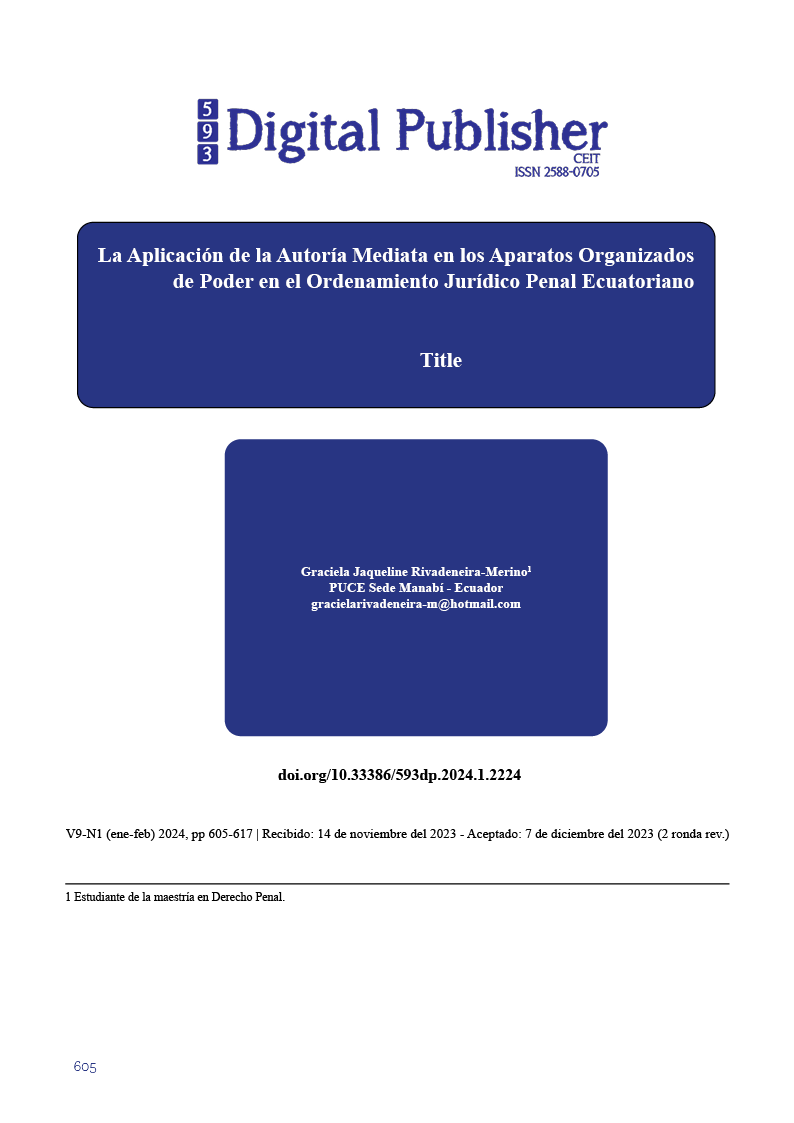The Application of Mediate Authorship in the Organized Apparatuses of Power in the Ecuadorian Criminal Legal System
Main Article Content
Abstract
This issue was raised because there is a problem that arises in legal praxis when judging the alleged perpetrators within a possible organization in apparatuses of power. It must be borne in mind that in order to do this, it is necessary to understand and comprehend what authorship is, and within this category, mediate authorship, in order to focus it on the organized apparatuses of power. In order to punish a person according to this position, all the necessary requirements must be proved, such as the mastery of the act, the fungibility of the immediate perpetrator or executor, the high availability, the position of authority, the existence of the organization and the power exercised in it. This issue causes a great deal of attention because in Ecuador there are cases in which the accused have been punished without being clear about what this dogmatic theory is referring to, not only in the sphere of the Attorney General's Office, but also in the authorities themselves, who issue sentences that deviate from the criteria. Even from the defenders and perpetrators of this type of crime, such as Roxin or Greco. It is, therefore, that this work is embodied in a study on this subject that is elaborated after an analysis of the doctrine and a practical case that was presented in Ecuador, qualified as emblematic.
Downloads
Article Details

This work is licensed under a Creative Commons Attribution-NonCommercial-ShareAlike 4.0 International License.
1. Derechos de autor
Las obras que se publican en 593 Digital Publisher CEIT están sujetas a los siguientes términos:
1.1. 593 Digital Publisher CEIT, conserva los derechos patrimoniales (copyright) de las obras publicadas, favorece y permite la reutilización de las mismas bajo la licencia Licencia Creative Commons 4.0 de Reconocimiento-NoComercial-CompartirIgual 4.0, por lo cual se pueden copiar, usar, difundir, transmitir y exponer públicamente, siempre que:
1.1.a. Se cite la autoría y fuente original de su publicación (revista, editorial, URL).
1.1.b. No se usen para fines comerciales u onerosos.
1.1.c. Se mencione la existencia y especificaciones de esta licencia de uso.
References
Albán Gómez, E. (2015). Manual de Derecho Penal Ecuatoriano. Quito: Ediciones Legales.
Alexy, R. (2000). Derecho injusto, retroactividad y principio de legalidad penal. Alicante: Doxa 23.
Bailone, M. (2010). El autor de escritorio y ejecutor fungible. Buenos Aires: Ediciones Jurídicas Olejnik .
Baraja de Quiroga, J. (2018). TRatado de Derecho Penal. Parte General . Pamplona: Thompson Reuters.
Caro John, J. (2003). Algunas consideraciones sobre los delitos de infracción de deber. Lima: Anuario de Derecho Penal.
Donna, E. (2001). El concepto de autoría de los aparatos organizados de poder. Córdova: Lerner.
Granja Angulo, P. (2020). El Caso Sobornos. Un Examen 10/20. Guayaquil: PrintColor.
Greco, L. (2017). Dolo sem vontade. traducido por Elisa Alemán. Medellín: Nuevo Foro Penal.
Heine, c. p. (2017). Dominio del hecho y autoría mediata en aparatos organizados de poder. Madrid: Editorial Dykinson.
Jakobs, G. (1997). Derecho Penal. Parte General. Madrid: Marcial Pons.
Joecks, c. p. (2006). El dominio de organización como forma independiente de autoría mediata . Santiago de Chile : REJ.
Muñoz Conde, F. (2011). La búsqueda de la verdad en el proceso penal. España: Hammurabi.
Rodríguez, F. (2020). Curso de Derecho Penal. Parte General. Tomo II. Teoría del Delito. Quito: Cevallos Editora Jurídica.
Roxin, C. (1963). Código Penal alemán comentado. Alemania: Goltdammer´s.
Roxin, C. (1997). Derecho Penal. Parte General. Madrid: Civitas.
Roxin, C. (2000). Autoría y dominio del hecho en matreria penal. Madrid: Marcal Pons.
Zambrano Pasquel, A. (2021). El Caso Sobornos. Ocaso del Garantismo Penal. Guayaquil: Murillo Editores.


